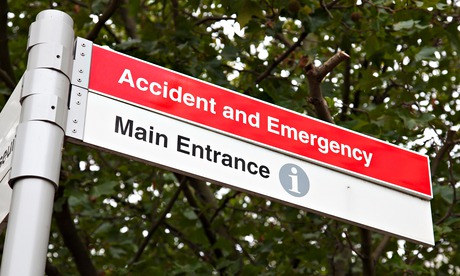Mental health patient admissions to A&E set to reach record levels
Former health minister Paul Burstow says if trend continues, numbers treated for mental health issues in A&E could soar to more than a million this winter
 Charities warn that people with mental health conditions are using A&E because they are ‘being let down by the rest of the system’. Photograph: Alamy
Charities warn that people with mental health conditions are using A&E because they are ‘being let down by the rest of the system’. Photograph: Alamy
The number of people with a mental health condition admitted to hospital as an emergency is likely to reach its highest level ever this winter, a former health minister has warned.
An estimated 280,000 mental health patients will be admitted to hospital as an emergency in the last three months of 2014, latest analysis suggests as emergency doctors warned that overstretched A&E departments are the wrong place for people in mental distress.
The government stopped publishing data on mental health treatment in A&E centres in 2012 but to estimate the scale of the problem Paul Burstow, who was a Liberal Democrat health minister until September 2012, requested a decade of figures from ministers which were then analysed by the consultancy firm Incisive Health. The analysis concluded that if the 10-year trend continued numbers treated for mental health conditions in A&E would have rocketed from 330,000 in 2002 to more than a million in 2014 for the first time.
The statistical projections are backed up by emergency doctors who say they are treating increasing numbers of people in mental health crisis. Charities have warned that people with mental health conditions are using A&E to get treatment because they are “being let down by the rest of the system”. While mental illness accounts for 23% of the total impact of ill health in this country, it gets only 13% of the NHS budget.
Burstow claimed it was the result of “societal issues tumbling into emergency wards”. Alcoholics are finding themselves at the doorstep of A&E wards while the number of children being admitted to hospital in England for self-harm is at a five-year high.
Bill Morgan, a founding partner of Incisive Health and a former adviser to the ex-health secretary Andrew Lansley, said: “With no signs that the financial pressure on the mental health sector will abate, these findings will be a wake-up call to NHS leaders over the Christmas and New Year break. If mental health emergencies continue to rise in this way, then there will be precious little capacity to meet the government’s mental health waiting time targets.”
Mark Winstanley, chief executive of Rethink Mental Illness said: “The fact that so many people with mental health problems are going to A&E for support shows how badly they are being let down by the system. Too often, going to A&E is the only way people can get any care at all, because mental health services are desperately underfunded and overstretched. Putting in place more specialist mental health services in A&E would be welcome, but it won’t come close to tackling these problems. What we really need to see is money redistributed from acute care, to transform the entire mental health system – so that everyone can get good care for their mental and physical health, no matter where they are or what their circumstances.”
A spokesperson for the College of Emergency Medicine said that mental illness patients “are an increasing part of the A&E workload”. He said a report released in November by the college into people brought to emergency departments who had been sectioned under the mental health act found “many reports of concerns of care for these vulnerable (patients)”.
“We understand that police cells are a poor place for these people, but so also is a busy emergency department, particularly if the patient has no physical health problems. An emergency department can be a frightening and disorientating place for a person suffering a crisis”.
Anne Hicks, the college’s mental health lead and a A&E consultant in Plymouth , said: “The reason that people end up at A&E is that we are big and we are open. People know there’s a single number to call to get an ambulance out and that is important when you are at home and dealing with a mental health crisis.
“The trouble is that not all emergency departments will have the right people to deal with what might be very complex patients and histories. But trying to get help before going to A&E is very difficult. In my own hospital we have three clinical commissioning groups, across two counties and different telephone help lines for adults and children. I am a specialist and I get confused trying to work out how to get help never mind someone suffering from a mental illness.”
A Department of Health spokesperson said: “We know the NHS is busier than ever before, which is why we’ve given the NHS a record £700m this winter for more doctors, nurses and beds to support both physical and mental health care. The NHS has ensured there are plans in every area to manage the extra demand.
“The benefits to mental health services from this money include more funding for liaison psychiatry in A&E departments, more support for people who have self-harmed and extra help for mental health crisis teams.”
Credit: The Guardian Newspaper
Why do people call Samaritans? – Samaritans
Please leave a comment below and help others with your feedback !

